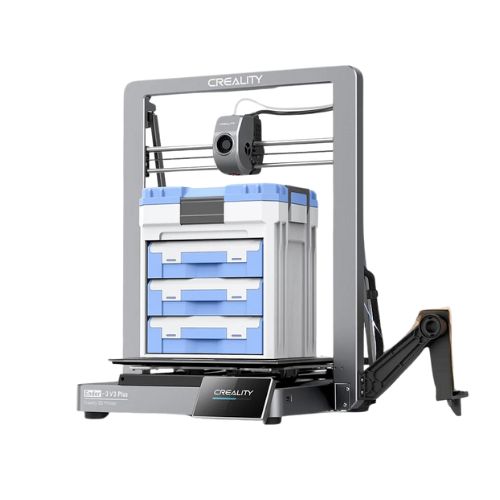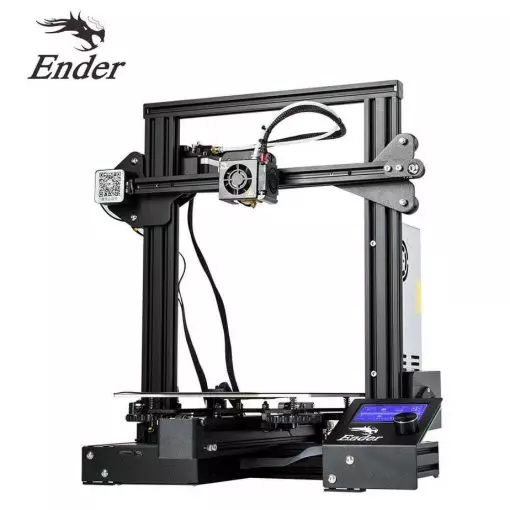Compare Ender 3 V3 Plus vs Ender 3
Comparison between the best 3D printers
Choose the best 3D printer at the best price. The cheapest 3D printers are here.
Buy a 3D printer here with 3D Fila.
 |
 |
|
| Model | Ender 3 V3 Plus |
Ender 3[BUY Ender 3] |
| Printing Material | Filament | Filament |
| Buy Filament for Creality Ender 3 V3 Plus | Buy Filament forCreality 3D Ender 3 | |
| Estimated price | $479,00 | $210,00 |
| Manufacturer | Creality | Creality 3D |
| Release Year | 2024 | 2018 |
| Print Volume [mm] | 300x300x330 | 220x220x250 |
| Printer Size [mm] | 410x445x577 | 440x440x465 |
| Weight [kg] | 11,5 | 6,62 |
| Power Loss Recovery | YES | NO |
| Enclosed printer | NO | NO |
| Bed Leveling | Automatic | Manual |
| Filament End Sensor | YES | NO |
| Bed type | Heated | Heated |
| Power supply system | Direct Drive | Bowden |
| Standard nozzle | 0,4 | 0,4 |
| Maximum Nozzle Temperature [°C] | 300 | 255 |
| Maximum Bed Temperature [°C] | 100 | 110 |
| Maximum printing speed [mm/s] | 600 | 180 |
| Filament holder | YES | YES |
| Camera for supervision | NO | NO |
| Recommended filaments | PLA, TPU(95A), PETG, ABS, PLA-CF, PETG-CF, CR-carbon | PLA, TPU, ABS, PETG |
| Recommended slicers | Bambu Studio, Super Slicer, Cura, Prusa Slicer, Orca Slicer, Creality Print | Cura, Simplify, Slic3r |
| Maximum Resolution [mm] | 0,1 | 0,1 |
| Processor | 8 bits | |
| Display | Touchscreen 4,3'' | Mono |
| Power Supply | 350 W | 24V / 270W |
| Connectivity | Wifi, Bambu bus, Cartão SD | SD / USB |
| Operating systems | Windows, Linux, Macbook | Windows, Mac, Linux |
| Date of registration in the system | 2024-05-10 | 2021-04-13 |
| Release date | 2024 | 2018 |
| Extra features | The Ender 3 V3 Plus incorporates significant advancements in 3D printing, featuring a build volume of 300300330mm. It features a Creality operating system based on Klipper, which supports advanced functions such as linear advance and input shaping, and allows precise adjustments through root access or expert mode. The CoreXZ motion system allows a printing speed of up to 600mm/s, with an acceleration of up to 20000mm/s². Equipped with a flexible build plate and a quick-change nozzle with a hardened steel tip, the printer offers simplified maintenance and increased durability. Additionally, the high-speed direct drive technology of the extruder, together with an automatic leveling system and filament end sensors, raise the standard for reliability and efficiency. Compatible with a variety of filaments, including PLA and PETG, the Ender 3 V3 Plus is a robust choice for 3D printing enthusiasts and professionals. | The Ender 3 V1 is a DIY assembly 3D printer, a sales leader since 2017, standing out for its cost-benefit. With a wide printing capacity, it has a CNC machined structure for precision and stability. It offers high-precision prints with low noise, thanks to its innovative V-profile and pulleys. It has a self-adhesive magnetic platform for easy removal of models and excellent adhesion. The Ender 3 heats up quickly, reaching 100°C in 5 minutes, ideal for agile prints. It includes protection against power failures, allowing you to resume printing after interruptions, saving time and material. |
| Support for multiple colors and materials (AMS and CFS) | NO | NO |
Notes * |
||
| Cost-benefit | 7 / 10 | 6 / 10 |
| Hardware | 3.2 / 10 | 0.5 / 10 |
| Tela | . | . |
| Print volume | 4 / 10 | 3 / 10 |
| Performance | 5 / 10 | 1 / 10 |
| [BUY Ender 3] |
Conclusion |
| In comparing the Ender 3 V3 Plus and the Ender 3, it's evident that both printers cater to different segments of the 3D printing market, offering distinct advantages based on user needs and budgetary considerations. The Ender 3 V3 Plus stands out with its advanced features and improved performance, making it a compelling choice for those who prioritize quality and efficiency in their printing tasks. Its larger print volume, faster printing speed, and automatic bed leveling system enhance user experience and output capabilities, appealing to both enthusiasts and professionals. The inclusion of power loss recovery, filament end sensors, and a direct drive extruder signifies a significant upgrade in reliability and versatility, particularly for complex projects and varied filament types. On the other hand, the Ender 3 remains a highly popular option due to its affordability and solid performance for entry-level users or hobbyists. While it lacks some of the advanced features of its newer counterpart, it still delivers commendable print quality within a more limited volume and speed. The manual bed leveling and absence of recovery options may deter users looking for ease and efficiency, but its established reputation and cost-effectiveness make it a sensible choice for those on a tighter budget who are exploring 3D printing as a hobby. Ultimately, the decision between these two models should hinge on the user's specific requirements: if budget constraints are a primary concern and basic functionality is sufficient, the Ender 3 is a great starter printer. Conversely, for those seeking advanced features, greater flexibility, and a faster workflow, the Ender 3 V3 Plus justifies its higher price with a superior set of capabilities and potential for more complex printing endeavors. |

